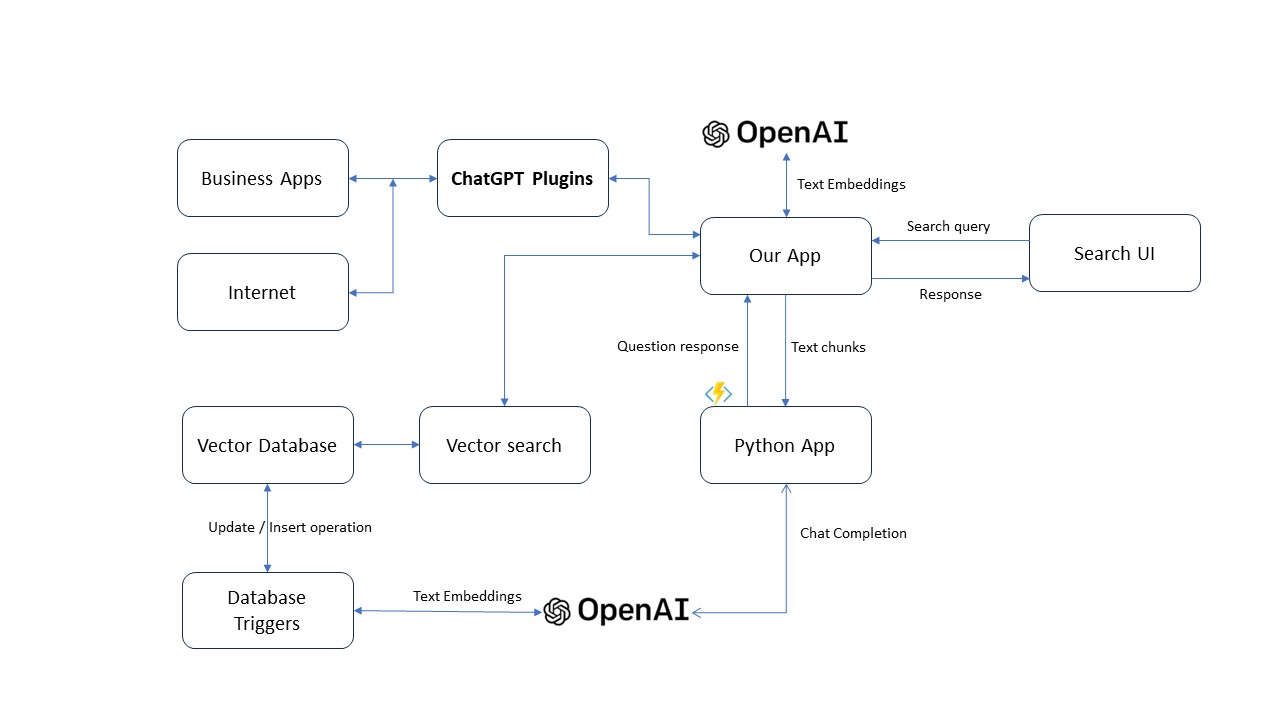Introduction
Generative Artificial Intelligence (AI) based technology changed the way we find information. Instead of putting in a search keyword and browsing through several search results, we open up ChatGPT and type the question we seek accurate answers for! The behavioral shift in consumers wanting accurate answers in a short span of time suits the Generative AI-based technologies to flourish.
ChatGPT is a prominent Generative AI technology that has been adopted very quickly. It took two months to reach 100 million active users for ChatGPT! However, there are various new use cases in which ChatGPT lacks capabilities. To address them, OpenAI introduced ChatGPT plugins such that ChatGPT can access up-to-date information, run computations using other computational engines, or use third-party services. Plugins enable ChatGPT to do things such as retrieve real-time information, retrieve knowledge base articles, and assist users in undertaking an action.
Role of ChatGPT plugins
ChatGPT plugins play a crucial role in enhancing the capabilities of the language model in the context of a knowledge base. These plugins serve as specialized modules that integrate additional functionalities into the ChatGPT system, enabling it to effectively interact with and retrieve information from a knowledge base. ChatGPT can tap into a vast repository of structured or unstructured data by incorporating plugins, providing accurate and relevant responses to user queries. One key aspect of plugins is their ability to leverage natural language processing techniques to parse and understand the content of a knowledge base. This allows ChatGPT to extract meaningful information from the knowledge base and generate contextually relevant responses to the user’s query. Whether the knowledge base consists of a collection of documents, a database, or a combination of both, plugins can utilize advanced algorithms to retrieve and present the most pertinent information to the user.

Moreover, plugins enable ChatGPT to go beyond simple keyword matching and employ more sophisticated search and retrieval mechanisms. For instance, a plugin can implement advanced search algorithms like semantic search or entity recognition to enhance the accuracy and precision of information retrieval from the knowledge base. By incorporating these techniques, ChatGPT can better understand the user’s intent and provide more nuanced and comprehensive responses.
Plugins empower ChatGPT with the ability to seamlessly integrate with a knowledge base, extract relevant information, and generate informed responses. They enable the language model to leverage sophisticated search and retrieval techniques, enhancing its accuracy and contextual understanding. With the aid of plugins, ChatGPT becomes a powerful tool for interacting with and harnessing the knowledge stored within a knowledge base.
Interested in Document360 Knowledge base? Schedule a demo with one of our experts
Book A Demo
Using ChatGPT plugins
A systematic approach can be followed to effectively use ChatGPT plugins in the context of a knowledge base. The following steps outline the process:
- Plugin Integration: Begin by integrating the desired plugins into the ChatGPT system. This involves setting up the necessary infrastructure and ensuring compatibility between the plugins and the knowledge base. The integration process may vary depending on the plugin and knowledge base used.
- Knowledge Base Indexing: Once the plugins are integrated, the next step is to index the knowledge base. This involves organizing and structuring the information to facilitate efficient retrieval. Depending on the type of knowledge base, this could involve preprocessing the documents or configuring the database for optimal search performance.
- Query Processing: When a user query is received, ChatGPT uses the plugins to process the query and retrieve relevant information from the knowledge base. The plugins employ techniques such as natural language processing, semantic search, and entity recognition to understand the user’s intent and extract meaningful information.
- Response Generation: After retrieving the relevant information from the knowledge base, ChatGPT utilizes the plugins to generate an accurate and contextually appropriate response. The plugins enable the language model to incorporate the retrieved knowledge seamlessly into its response generation process, resulting in more informed and relevant answers to user queries.
The role of ChatGPT plugins in the context of a knowledge base is undeniably significant. These plugins enhance the capabilities of the language model by integrating specialized modules that facilitate effective interaction with and retrieval of information from a knowledge base. By leveraging natural language processing techniques and advanced search algorithms, plugins enable ChatGPT to extract meaningful information, understand user queries, and generate contextually relevant responses.
Also, Checkout our article on ChatGPT in Knowledge Management
Closing remarks
Incorporating plugins empowers ChatGPT to go beyond simple keyword matching and tap into the vast repository of structured or unstructured data in a knowledge base. This enhances the accuracy and precision of information retrieval, allowing ChatGPT to provide comprehensive and informed answers. With the ability to seamlessly integrate with a knowledge base, ChatGPT becomes a powerful tool for harnessing the knowledge within, making it an asset in various domains such as customer support, research, and more.
By leveraging ChatGPT plugins in the context of a knowledge base, organizations and users can unlock the full potential of their data. With the ability to access and utilize information from a knowledge base effectively, ChatGPT becomes a reliable and intelligent assistant capable of providing accurate and valuable insights. The role of ChatGPT plugins in the knowledge base ecosystem represents a significant step towards enhancing human-machine interaction and fostering a more knowledgeable and efficient digital experience.
Read More: ChatGPT and the Future of Customer FAQs: Trends and Predictions



 –
– 

